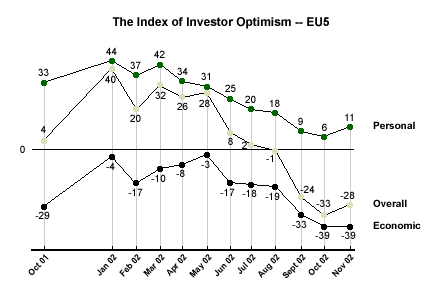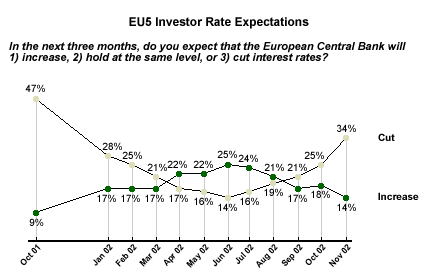When the Fed lowered U.S. interest rates following the midterm elections early last month, the European Central Bank (ECB) refused to follow suit. The ECB argues that its mandate is significantly different from that of U.S. monetary policy-makers -- by law, the ECB's primary responsibility is to maintain price stability.
Fed policy-makers, however, may have talked to their European counterparts during the past few weeks about the slowing world economy and the need for added liquidity. Rumors abound that the ECB is going to lower interest rates when it meets this week. Such action would certainly be in line with the continued pessimism among EU5 investors and the hopes of many that the ECB will act to stimulate the European economy.
EU5 Investors Remain Pessimistic
According to the Index of Investor Optimism -- EU5 -- a joint effort of UBS and Gallup*, European investor sentiment improved slightly in November but remained pessimistic. The EU5 Index improved to -28, -- up five points from -33 in October. Even with this modest improvement, the Index remains below its September level of -24 and far below its August level of -1. The November reading is the EU5 Index's second most negative measurement since it was established in October 2001 at 4.
The slight improvement in the overall EU5 Index in November was a result of an improvement in the Index's Personal Dimension. This dimension increased from 6 in October to 11 in November. The Personal Dimension hit its 10-month high in January at 44. By September, it had declined to 9, before falling to a new low of 6 in October. From an economic outlook perspective, this is probably the most positive aspect of the September and October survey results. Although EU5 investor perceptions along the Personal Dimension remain in positive territory, they are also still close to their recent lows.
The Economic Dimension of the EU5 Index remained unchanged in November. This dimension had been plunging over the previous 3 months -- from -19 in August to -33 in September to -39 in October. European investor sentiment toward the economy continues to be more negative now than it was about a year ago, when investors rated this dimension at -29.

More EU5 Investors Expect Lower Rates
Opinions concerning the ECB's current interest rate policy are equally divided: half of EU5 investors say they approve of the ECB's current policies and the other half say they disapprove. This is the first time since last October that so many investors have disapproved of their monetary authority's interest rate policies. Usually, more European investors approve than disapprove of the ECB's policies, just as the majority of U.S. investors tend to approve of the Fed's interest rate policies. Of course, if the Fed had not lowered interest rates in early November, many more U.S. investors would probably view it more negatively.
It may be that public opinion, not just the state of the world economy, is the reason that one in three EU5 investors (34%) say they expect the ECB to cut interest rates in Europe in the next 3 months. This is the second-highest percentage of EU5 investors expecting a cut in interest rates -- the highest percentage Gallup measured was 47% in October 2001. Still, 43% of investors expect that the ECB will hold interest rates at their current level, while 14% expect the ECB to increase rates.

Key Points
Given the relatively pessimistic state of average investor opinion in both the United States and Europe, it would seem only logical that the ECB follow the Fed's lead in lowering interest rates. It is hard to imagine that Europe's monetary policy-makers want to see the U.S. economy recovering while the European economy lags far behind.
On the other hand, many economic prognosticators are saying that the U.S. economy is much stronger than is generally perceived. They point to a number of positive economic numbers reported last week, and argue that the Fed is pouring liquidity into the economy and that capital spending may be showing some signs of life.
It may be that the current 8-week surge on Wall Street is the result of investors correctly anticipating better economic conditions during the first half of 2003. If that is the case, then investor/consumer confidence may soar again this year as it did late in 2001. Hopefully, however, the ECB should not use this surge in equity market optimism as an excuse for inaction. The world's economy needs the ECB's help if it is going to get a real recovery going next year; whatever the difference in monetary policy mandates, the task should not be left to the Fed alone.
*Results for the Index of Investor Optimism -- EU5 are based on interviews with approximately 200 investors each in France, Germany, Great Britain, Italy, and Spain conducted Nov. 1-17, 2002. For results based on a total sample of approximately 1,000 investors, one can say with 95% confidence that the margin of sampling error is ±3%. In addition to sampling error, question wording and practical difficulties in conducting surveys can introduce error or bias into the findings of public opinion polls.

